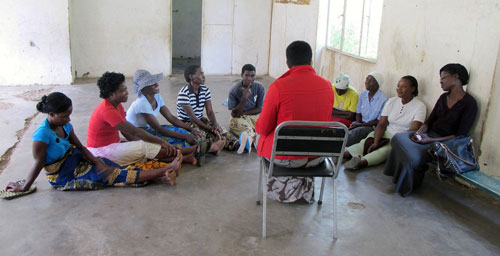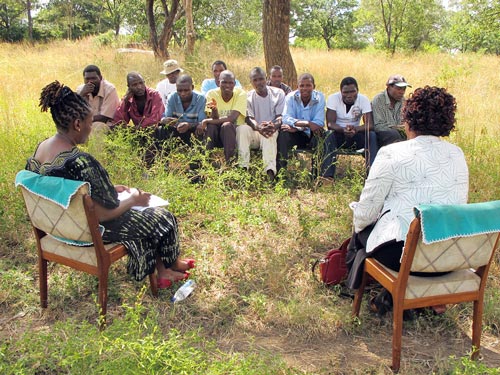By Wandera Ojanji/CIMMYT
The Effective Grain Storage for Sustainable Livelihoods of African Farmers Project (EGSP) Phase II is conducting a study to help understand gender dynamics in maize post-harvest management in Kenya, Malawi, Zambia and Zimbabwe. The results of the study, Gender Analysis for Maize Post Harvest Management, will guide the project implementation team to develop a strategy that will ensure equitable processes and outcomes for men and women farmers in target communities.

Photos: Wandera Ojanji
Vongai Kandiwa, CIMMYT gender specialist and the study team leader, spoke of the need to understand how cultural norms such as gender roles and rights influence patterns of access to and control of the metal silos, Super Grainbags and other resources. “The study will help the project team to develop a better understanding of the communities in which EGSP II is implemented. It will also help improve the team’s capacity to develop strategies to foster gender equality and anticipate unintended negative outcomes for particular groups in communities,” Vongai said.
Vongai said the study will help the project team in four ways: First, at the household level, a gender analysis will reveal the roles that men, women and youth play in post-harvest management, as well as technology preferences, aspirations and constraints.

Second, a gender analysis at the technology design level will help the project team to understand metal silo artisans’ capacity to develop and implement strategies that ensure both business growth and equitable access across different social groups, including women.
Third, CIMMYT collaborates with many partners such as NGOs in disseminating and testing improved post-harvest technologies. A gender analysis will reveal evidence on the capacity of partners to carry out gender-responsive technology and information dissemination activities.
Lastly, the study will reveal existing knowledge and knowledge gaps on gender in post-harvest management and how they might be filled.
The gender analysis study draws on survey data as well as qualitative data. Part of the qualitative data is collected through sex-disaggregated focus group discussions. Vongai said those discussions open up possibilities and space for amplifying women’s voices because issues of post-harvest, especially grain management and control, are inherently influenced by household power relations. Moreover, technology preferences are seldom gender-neutral.
EGSP-II (2012-2016) builds on the previous phase (2008-2011) and aims to improve food security and reduce the vulnerability of resource-poor farmers – particularly women – in Eastern and Southern Africa through the dissemination of effective grain storage technology. The project is funded by the Swiss Agency for Development and Cooperation (SDC) and will help smallholder farmers in Kenya, Malawi, Zambia and Zimbabwe acquire more than 16,000 metal silos and 24,000 Super Grainbags, which will reduce grain losses from storage pests.
 Innovations
Innovations 
